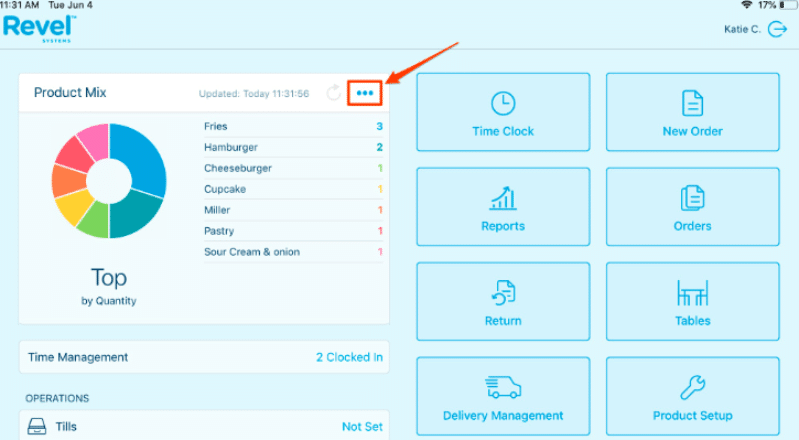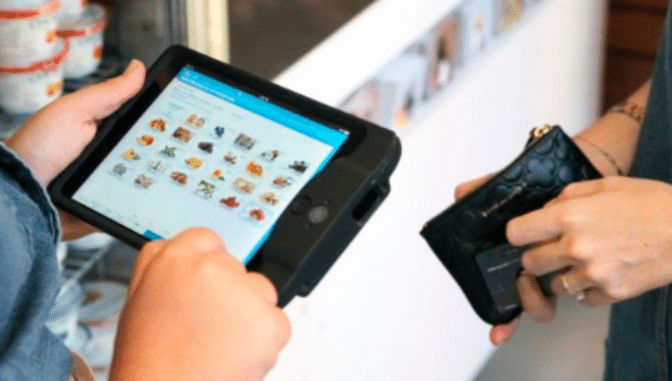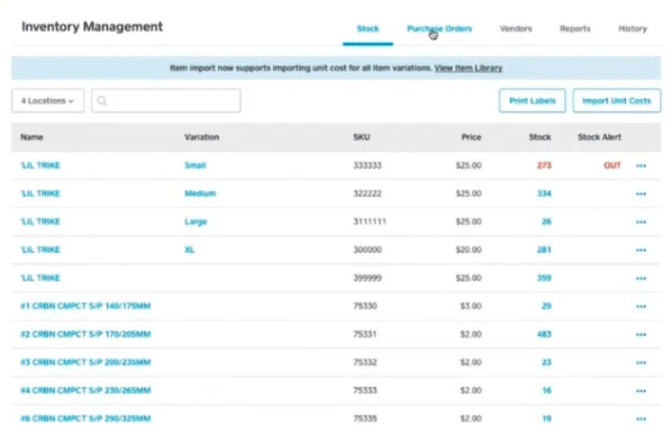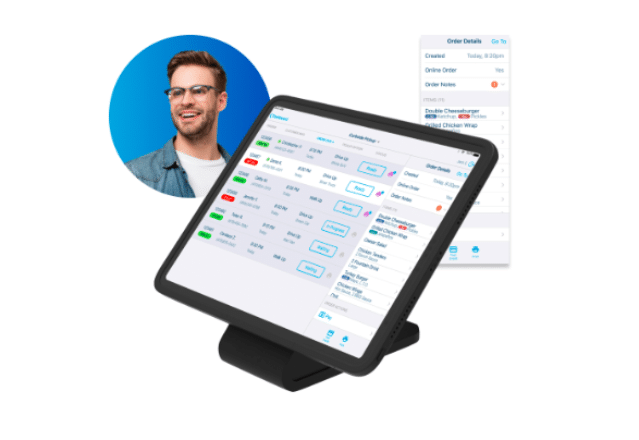- Solutions
-
-
Use Cases
-
-
-
- Our Resources
ARTICLES
- Blogs
- Case Studies
- Everything you need to know
- FAQ
DOWNLOADABLES
- eBooks & Whitepapers
- Videos
- Company
- Contact Us
- Request Demo
Use Cases
ARTICLES
DOWNLOADABLES
In hospitality, staying ahead of the competition means embracing technology that enhances efficiency, improves customer service, and streamlines operations.
One solution successful restaurants are turning to is cloud-based EPOS (Electronic Point of Sale) systems.
Unlike traditional systems, cloud EPOS offers greater flexibility, real-time data access, and seamless integration with other tools.
This shift to the cloud empowers restaurants to operate more efficiently, deliver exceptional customer experiences, and adapt quickly to industry changes.

Cloud-based systems grant the ability to access real-time data from anywhere, on any device with an internet connection.
Traditional systems generally require on-site access or manual syncing, limiting flexibility and slowing down critical decision-making. Cloud based POS systems allow restaurant owners to stay connected with their business at all times, whether they’re on the floor, in the back office, or offsite.
With real-time access to sales data, restaurant operators can monitor transaction activity as it happens.
This provides a clear and immediate view of top-selling items, sales trends, and peak business hours, allowing for on-the-fly adjustments.
Whether it’s deciding to push a high-margin item during a busy shift or adjusting staffing levels based on current sales, having this data instantly available leads to smarter, more responsive decisions.
A cloud EPOS system can manage inventory levels in real-time.
As orders are processed, stock levels are updated automatically, providing a live snapshot of what’s in the kitchen and what’s running low.
This also allows for better planning and cost control, helping restaurants avoid waste and ensuring that you always have what you need to meet customer demand.
Cloud based POS systems also allow for the collection and analysis of customer data.
The system can track customer preferences, order history, and spending habits. This can be used to tailor promotions, design personalised marketing campaigns, and enhance loyalty programs, all aimed at improving customer retention and boosting repeat business.
This real-time data means restaurant operators can make informed decisions quickly.
Whether it’s optimising menu offerings, adjusting pricing strategies, or managing labour costs, cloud EPOS provides actionable insights that are crucial for running a profitable restaurant.
Performance tracking also becomes more accurate, allowing managers to monitor KPIs like average spend per customer, table turnover rates, and staff productivity—all in real time.

Cloud POS provides remote access, allowing restaurant owners and managers to oversee operations from anywhere in the world, as long as they have an internet connection.
This flexibility offers unparalleled convenience and control.
With a cloud based EPOS system, restaurant management is no longer confined to a single location.
Owners and managers can log in remotely to monitor sales, track inventory, and analyse performance metrics in real time.
Remote access also allows managers to perform critical tasks like updating menus, changing prices, and reviewing staff schedules from anywhere.
For chains or those with multiple locations, cloud EPOS systems offer a powerful advantage in maintaining consistency across the brand. Managing several locations with a traditional, standalone point of sale system can result in disjointed operations, data silos, and inefficiencies.
With a cloud-based system, data from different locations is centralised, allowing for seamless access and management across the board.
Managers can compare performance metrics between locations, identify underperforming branches, and implement improvements swiftly. Menu updates, promotional campaigns, and pricing adjustments can be rolled out across all sites instantly.
Accessing the system remotely facilitates better collaboration between staff and managers, even when managing multiple locations.
The cloud-based nature of the system allows for seamless communication between kitchen staff, servers, and management, reducing errors and improving service delivery.
As your restaurant business grows, cloud EPOS systems provide the flexibility to scale without the need for costly hardware upgrades or complex system integrations.
New locations can be added to the platform with ease, and data from all sites remains accessible in one central hub. This scalability ensures that the EPOS system grows with your business, helping you to maintain operational consistency and high service standards as you expand.

With real-time tracking, automation features, and seamless integrations, cloud EPOS transforms the way restaurants manage stock levels, interact with suppliers, and control costs.
Cloud POS systems allow restaurant operators to monitor inventory levels in real time, ensuring that stock counts are always accurate.
As items are ordered and processed through the system, the inventory is automatically adjusted. This eliminates the need for manual stock checks, reducing the risk of human error.
Real-time monitoring also lets restaurants identify trends in product usage, helping managers anticipate busy periods and adjust stock levels accordingly. This reduces waste, prevents overstocking, and ensures that popular items are always available during peak hours.
Cloud EPOS systems can be configured to automate the reordering process, ensuring that key ingredients and supplies are replenished before they run out.
When stock levels reach a predetermined threshold, the system can automatically trigger orders to suppliers, reducing the risk of shortages that could impact service quality. This not only saves time for managers but reduces the likelihood of costly last-minute orders or rushed deliveries.
One of the biggest challenges in inventory management is balancing stock levels to avoid shortages and overstocking. Cloud EPOS helps restaurants strike the right balance by providing insights into which items are selling quickly and which are not.
By analysing past sales data, the system can predict demand and suggest optimal stock levels, ensuring that restaurants order just the right amount of each product. This predictive capability reduces waste, lowers food costs, and keeps you prepared to meet customer demand.
Another significant benefit of cloud EPOS systems is their ability to integrate with suppliers. Many cloud EPOS platforms allow restaurants to link directly to supplier portals, streamlining the ordering process.
This means that managers can place orders, track deliveries, and even negotiate pricing without leaving the EPOS system.
Restaurants can track order histories, review past invoices, and compare prices, making it easier to manage supplier relationships and optimise purchasing decisions.
Cloud EPOS systems can also be integrated with accounting software, allowing for seamless financial tracking and ensuring that costs are recorded accurately in real time.
These systems provide better visibility into the entire supply chain. Managers can track orders from suppliers, monitor delivery times, and identify any delays or disruptions that could impact the kitchen.
This visibility helps restaurant operators react quickly to supply chain issues, whether that means finding an alternative supplier or adjusting the menu to reflect available ingredients.

Delivering an exceptional customer experience is key to building loyalty and ensuring repeat business.
Cloud EPOS systems play a significant role in enhancing this experience by streamlining operations, reducing wait times, and offering personalised service.
Additionally, features like loyalty program integration and online ordering provide added convenience for customers, helping restaurants stand out in a crowded market.
One of the most immediate ways cloud EPOS systems improve the customer experience is by speeding up order processing. With orders entered directly into the system and instantly sent to the kitchen, the risk of errors is reduced, and service becomes more efficient.
Servers can quickly take orders via tablets or mobile devices, eliminating the need for handwritten notes or trips back and forth to the terminal. This ensures that orders are processed faster, which in turn reduces wait times for customers.
Restaurants with busy takeout or delivery services can also streamline order management. Orders placed online or through third-party apps are automatically integrated into the system, reducing delays and ensuring that both in-house and delivery customers receive their meals promptly.
Cloud EPOS systems allow restaurants to offer more personalised service.
By storing customer data, including past orders, preferences, and even allergy information, restaurants can tailor the dining experience to individual guests.
This level of personalisation helps build stronger relationships with customers.
Restaurants can also use customer data to send personalised offers, discounts, or event invitations, further improving customer satisfaction and encouraging repeat visits.
Whether it’s sending a birthday promotion or offering a discount on a frequently ordered item, these targeted marketing efforts can significantly boost customer engagement and loyalty.
Many cloud EPOS systems come with built-in loyalty program features, making it easier for restaurants to reward their most loyal customers. Instead of relying on physical punch cards or manually tracking points, cloud EPOS systems automatically track customer spending and reward points.
This allows restaurants to seamlessly implement and manage loyalty programs, encouraging customers to return more often.
For customers, loyalty program integration simplifies the process of earning and redeeming rewards.
Whether they dine in or order online, their points are tracked across all platforms, making it easy for them to accumulate rewards and enjoy benefits like discounts, free items, or exclusive offers.
The growing demand for online ordering and delivery has made it essential for restaurants to have a system that can efficiently handle both dine-in and remote customers.
Cloud EPOS systems can integrate seamlessly with online ordering platforms, allowing customers to place orders through a restaurant’s website or app without any extra steps required by staff.
When an order is placed online, it goes directly into the EPOS system, where it is treated like any other order—minimising the risk of errors or delays. This ensures that the kitchen and front-of-house staff remain in sync, even when managing multiple channels of service.
Online ordering integration also allows for greater consistency in customer experience. Customers can easily customise their orders, view menu updates, and even track their delivery, all while their information is saved in the system for future orders.
Cloud EPOS systems enhance the payment process by offering a variety of payment options.
Whether customers prefer to pay by card, mobile wallets like Apple Pay or Google Pay, or even through contactless options, cloud EPOS ensures a smooth and fast transaction.
In some systems, customers can split bills easily or leave tips digitally, streamlining the checkout process and reducing friction at the end of their dining experience.

Managing staff efficiently is critical to running a successful restaurant, and cloud EPOS systems provide powerful tools to simplify this process.
From tracking employee hours to optimising labour costs, these systems help reduce administrative burdens while ensuring smooth operations.
Cloud EPOS systems allow for real-time tracking of employee hours, making it easy for managers to monitor attendance and ensure that staff are working their scheduled shifts.
Employees can clock in and out directly through the system, allowing the EPOS to capture exact work times without relying on manual timekeeping methods. This not only reduces the potential for errors but also guarantees accurate payroll.
These systems allow managers to set alerts for overtime or violations of labour regulations, helping them stay compliant with local employment laws.
With this real time data, managers can quickly address any issues, such as late arrivals or early departures, which may impact service quality or labour costs.
Labour costs are one of the largest expenses in the restaurant industry, and controlling these costs is vital for maintaining profitability. Cloud EPOS systems offer detailed reporting on labour expenses, allowing managers to track labour as a percentage of sales in real time.
This feature helps restaurants ensure that they are operating within budget and can highlight any instances where labour costs may be disproportionately high.
By analysing labour reports, managers can identify trends, such as overstaffing during slow periods or understaffing during peak hours, and make adjustments to optimise staffing levels.
One of the biggest time-savers provided by cloud EPOS systems is automated employee scheduling.
Rather than manually creating staff schedules each week, managers can use the system to automatically generate schedules based on past sales trends, employee availability, and labour cost goals. This reduces the time spent on administrative tasks and ensures that the restaurant is adequately staffed for every shift.
Automated scheduling also helps prevent common scheduling issues, such as double-booking employees or accidentally leaving key positions unfilled. The system can flag potential conflicts, helping managers avoid problems before they arise.
By automating many of the tasks involved in employee management—such as tracking hours, processing payroll, and creating schedules—cloud EPOS systems significantly reduce administrative workloads for restaurant managers.
Instead of spending hours manually entering data or juggling spreadsheets, managers can rely on the EPOS system to handle these tasks efficiently and accurately.
Cloud EPOS systems can also help restaurants stay compliant with labour laws, for example, ensuring employees receive proper breaks or that overtime is compensated correctly.
The system can be set to track break times and alert managers if an employee hasn’t taken their required break, reducing the risk of labour law violations.
By having accurate records of employee hours and schedules, restaurants can avoid disputes over pay and working hours, leading to greater accountability and transparency in the workplace.
By streamlining scheduling and giving employees more control over their shifts, cloud EPOS systems can also boost staff engagement and morale.
Workers appreciate the ability to easily view and manage their schedules, request time off, or switch shifts with ease. When staff members feel more in control and are better informed about their shifts, it leads to a more positive working environment, which can reduce turnover and improve performance.

Cloud-based EPOS systems have the potential to deliver significant cost savings and efficiencies.
They reduce the upfront expenses associated with traditional, hardware-heavy solutions and minimise ongoing maintenance fees.
Traditional EPOS systems often require expensive, specialised hardware like servers, desktop terminals, and networking equipment, which can lead to high initial setup costs. In contrast, cloud EPOS systems rely on off-the-shelf devices like tablets, smartphones, or basic point-of-sale terminals.
Since all the data is stored and processed in the cloud, there’s no need for bulky on-site servers, reducing not only hardware costs but also space requirements in the restaurant.
In traditional EPOS systems, hardware maintenance and software upgrades can be costly and disruptive. Repairs to hardware like terminals, servers, and printers, as well as regular system updates, often require outside technical support, adding to the overall expense.
Cloud EPOS systems are maintained and updated by the service provider remotely, reducing the burden on restaurant operators. Software updates, security patches, and system improvements are automatically deployed without the need for on-site technicians, keeping the system running smoothly with minimal downtime.
This also means that restaurants always have access to the latest features and security measures without any additional cost, further lowering the total cost of ownership.
Many cloud EPOS providers offer subscription-based pricing models, which make it easier for restaurants to manage their cash flow. Instead of paying a large upfront sum for hardware and software, restaurants can spread their costs over time by paying a monthly or annual subscription fee.
This facilitates more predictable budgeting and avoids the need for hefty upfront investments.
These subscription plans typically include customer support, software updates, and data backups, ensuring that restaurants get ongoing value without worrying about hidden costs or surprise fees.
In an increasingly competitive industry, adopting a cloud-based EPOS system can be a game-changer.
From real-time data insights and improved customer experience to streamlined inventory management and cost efficiency, the benefits of cloud EPOS are clear.
Whether you’re a single-location eatery or a growing restaurant chain, cloud EPOS offers the flexibility, scalability, and innovation needed to stay ahead of the curve.
Contact NFS Hospitality to help you find the best platform for your business.